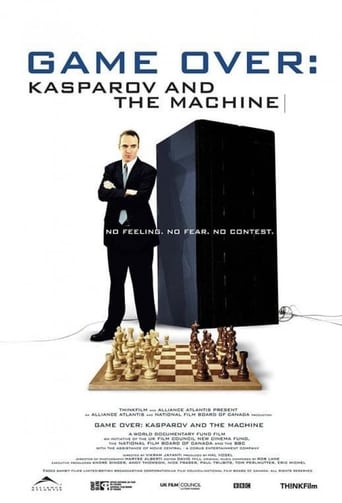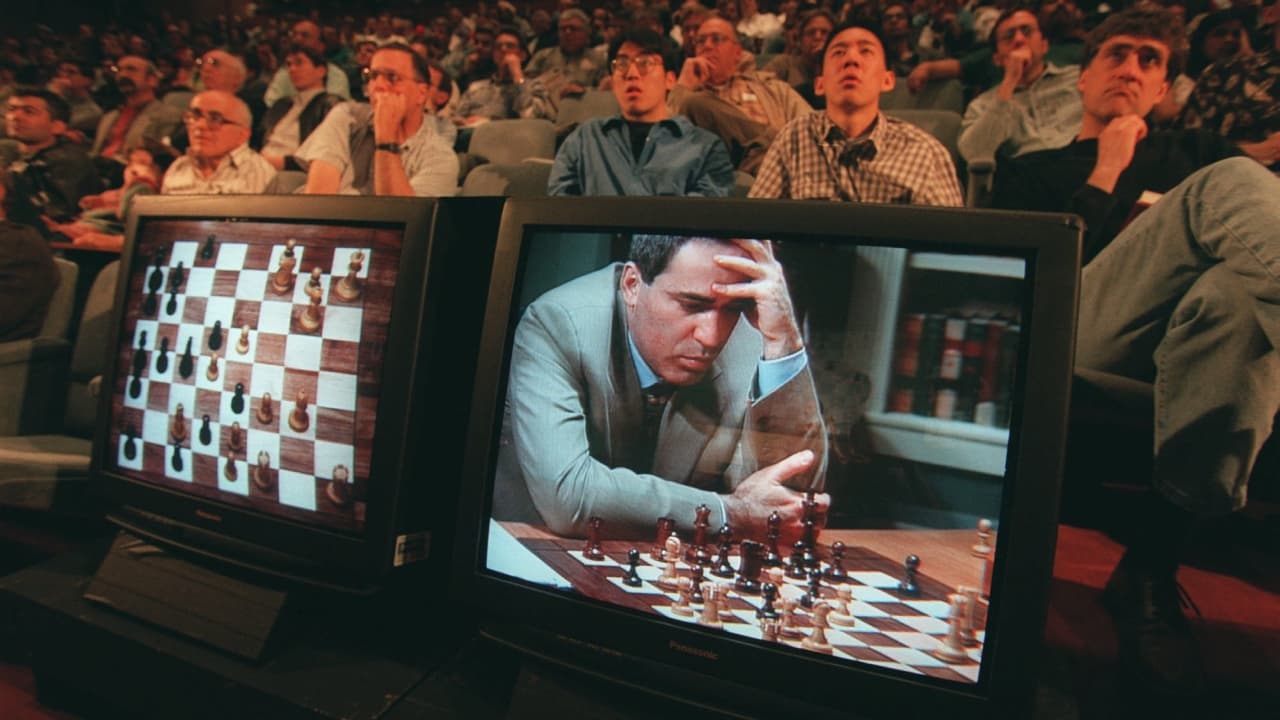moogyboy
I should first point out that I'm just a couple of ear hairs past novice level when it comes to chess, so I'm not a complete outsider to the subject at hand...just on the periphery. But I digress."Game Over" isn't a documentary so much as a position paper, the kind that an insecure college freshman with a chip on his shoulder would write for a first semester English class. (I should know.) There's tantalizing material here that the director, like a bad chess player, doesn't follow up on because he's fixated on other stuff that's more immediately gratifying. Mainly attacks.I'll get this out of the way now: the film is unapologetically biased. The director's reverential attitude toward Garry Kasparov and contempt for the IBM team comes through loud and clear in just about every frame. There is no ambiguity--no real ambiguity, just the "you decide" kind that's so common in those paranormal-themed TV shows on the Discovery Channel where you just know what *they* think the truth is. The film takes Kasparov's assertions at face value: *of course* IBM must have had human hands behind the scenes helping Deep Blue; they had to have been playing mind games to break him; naturally they wouldn't let him look at the logs--something fishy's going on! When the IBM boffins get the camera, every single one is made to look like an arrogant, lying sum'bitch. The conspiracy angle is played up and up, bolstered by the now well-noted creepy (and very annoying) whispering and cutaways to The Turk. Our director (no, I don't remember his name and would be too impatient to keep typing it) doesn't let up on hammering his point into our heads, and certainly doesn't provide us with sufficient material to truly make up our own minds about What Really Happened. I won't take sides on that subject, other than to say that nowadays the idea of a computer trouncing a top Grandmaster certainly doesn't seem very controversial to me, although at the time I can understand how Kasparov could have gotten freaked.So what we have here could have been a good hour or so program on one of those cable channels that specializes in nonfiction programming. Yes, I'm sure they could have pruned it down into a much tighter picture if they'd just lost all the superfluous Turk and eerie-corridor shots, not to mention annoying commentary from Kasparov's manager and others.But that's not what's really fascinating in this movie. Even without the kooky paranoia angle (except that which comes straight from Kasparov) we have a very compelling human drama waiting to be explored: man vs machine; man vs corporation; man vs his own ego, reputation, and past. Kasparov is an engaging and complex figure, cocky at the beginning, perplexed and frantic in the middle, and vulnerable and all too human at the end. The unbeatable met his match and it changed him irrevocably; the story of Kasparov vs Deep Blue is classic tragedy. Even the programming team didn't get to gloat. I would have liked to hear more about why, in the words of the lead Asian programmer, "it sucked".But villains don't get to tell their side of the story, and I doubt our director knew that he had a classic tragedy to tell, or even what tragedy is. (I also don't get much sense that he knows much about chess itself either.) In his hands, it's just plain old melodrama--based, as they say on TV, on a true story. Good guys, bad guys, and a lot of padding. I basically would have preferred if Kasparov and the IBM people would have just been allowed to tell their stories in their own way, they're clearly interesting enough subjects without the "help" of the director's editorializing...but WITH the help of position diagrams, commentary on the games themselves from chess masters, etc. That might have given even lay viewers some context, an appreciation of the deeply complex analysis over which gray matter grappled with silicon.It's reasonably well-made, though, from a technical standpoint. There's some nice camera-work and editing too, just not enough, and at the same time too much. Ponder what "Game Over" (no subtitle) would have looked like in the hands of, say, Frederick Wiseman. Just as an experiment.
tomgillespie2002
When James Cameron released The Terminator back in 1984 with its mythology of a future robot-human war that would lead to the planet's possible destruction, I doubt he would have envisaged a similar battle taking place thirteen years later. But there would be no time-travelling cyborg, no unborn future saviour, no battle-scarred landscapes full of human skulls, and certainly no Michael Biehn. This one was much more low-key. It consisted of one genius chess player, one super-computer, and a small band of smug computer nerds.After beating IBM's Deep Blue computer in a chess match in 1996, world champion chess master Garry Kasparov, widely regarded as the best player in history, agreed to take up a re-match a year later. This time, IBM believed it had something up his sleeve, recruiting former chess champions to 'teach' Deep Blue how to play like a human. It was to be a fun experiment, pitting man against machine. After demolishing Deep Blue in the first round, IBM came back in the second to beat Kasparov. Sending Kasparov into a paranoid decline as Deep Blue's power became apparent, he starts to wonder about the legitimacy of IBM's claims, the goings-on behind closed doors, and why the IBM corporation are refusing to show the computer match logs.First of all, for a documentary about chess, this is purely riveting stuff. The psychological torment that can be experienced by chess players engulfs Kasparov. As the experts say, chess is a game where you must be expectant and suspicious of your opponent, making it an ultimately paranoid game. The mind games that Kasparov accuses IBM of playing on him just destroys him, and his deterioration is played out in the fantastic stock footage of the match. The film eventually becomes not only a study of what it means to be human, but also a commentary on the corruption of corporations - I must say, although nothing is proved, it is clear where director Vikram Jayanti's beliefs lie.The film begins with title cards explaining how an 18th-century chess- playing machine called 'The Turk' managed to beat a number of players, including Napoleon Bonaparte. It was apparently a well-constructed machine, but was in fact a hoax, and tricks and construction allowed for a person to fit inside it, but create the illusion that only cogs and mechanics lay inside. It is used as an obvious metaphor for the accusation faced by IBM of cheating and playing the man in the machine. In fairness, the film offers the men behind Deep Blue the chance to have their say, and they do themselves no favours. They come across as arrogant and smarmy. Yet the film's obvious siding with Kasparov seems unfair given that the accusations made against IBM are unproven, and no evidence is offered in the film.That flaw aside, this is undoubtedly a gripping documentary, and Kasparov makes for a warm host and narrator. The match seemed to have its effect on Kasparov, as he soon lost his world title afterwards, and the mental strain and bitterness is still there to see. It did actually make me want to play chess too, although I'm crap.www.the-wrath-of-blog.blogspot.com
Dhaval Vyas
Being an admitted chess addict, I was excited to see a documentary about the 1997 rematch between Garry Kasparov and IBM's Deep Blue supercomputer. I was hoping to see an in depth look at the match and a lot of what Kasparov had to say. Boy was I wrong and misguided by a mile. This documentary is a lot like many modern documentaries - there is a lot of flash but no real substance. After watching it, I am sad to say, I felt like I wasted my time. One of the most annoying aspects about the documentary is that it does not stay at one place for a decent period of time. It has the typical MTV type editing, where the camera shows different images and quick sound bites from people every five seconds. It is very sad that film-making has been watered down to the attention span of a 10-year old child.I understand it is difficult to make a film about chess, but that does not mean one should make it flashy. 'Game Over' did have a couple of interesting ideas though. It brought up the idea whether computers can think like human beings or not; whether computers have advanced to a unique new level. This is what Kasparov thought after the match, but this film does not go deep enough with this idea. Also, this film tries to bring in a bizarre theory. It tries to imply the paranoid that a human being was making the moves along with the help of the computer. Kasparov had suspicions about this, but still to this day there is no evidence. Towards the end of the film, it tries to imply the bizarre that maybe Anatoly Karpov might have been the human being who was secretly making the moves with the aid of Deep Blue. Interesting to think about, but I don't know how plausible or realistic it is. I still would not recommend this movie though, not even for chess addicts.
Balibari
Vikram Jayanti's documentary on the 1997 clash between IBM super-computer Deep Blue and Russian chess grand master Garry Kasparov is frustrating and fascinating in equal measure.Kasparov's insistence that IBM cheated (by using one or more chess masters to influence the computer during the match) seems perfectly possible, but the computer manufacturers refusal to allow either a rematch or analysis of their data makes it impossible to substantiate the claims. Sadly that doesn't stop Jayanti, his subjective approach is unaffected by the apparent stalemate.Fortunately the film has more to offer. The actual match becomes hugely dramatic and exciting in Jayanti's hands. Kasparov himself is an extremely enigmatic and passionate figure, the footage of him in the press conferences that took place after each of the six games is dynamite. In the second, he accuses IBM of cheating. In the last, after nine days of play, he appears on stage looking physically and mentally destroyed, the applause that greets him (and the boos for IBM) would seem to indicate a general feeling of suspicion of IBM's sportsmanship and honesty.Too subjective to be a 'great' documentary, it is still a fascinating insight into a game and community that would seem to offer much potential for future study.


 AD
AD

